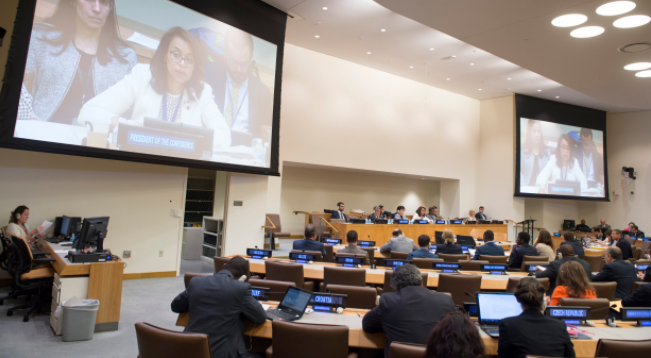United Nations Fulfills Goal of Banning Nuclear Weapons

Image Courtesy of un.org
By Franchetta Groves
On October 24, the United Nations made history when it officially banned the usage of Nuclear Weapons. Honduras was the 50th country to sign the treaty, thus ratifying it and ensuring that it will go into effect on January 22, 2021.
The official name of the treaty is “Treaty on the Prohibition of Nuclear Weapons” and it was first drafted in July of 2017. A minimum of fifty signatures is required for a treaty to become international law. Many influential countries refused to ratify the treaty, including the United States, Russia, China, Britain, France, India, Pakistan, North Korea, and Israel. Not only have these countries refused to sign the treaty, but they have also boycotted negotiations. For those countries who have refused to sign the treaty is non-binding.
The treaty requires all countries who have signed the agreement to “never under any circumstances … develop, test, produce, manufacture, otherwise acquire, possess or stockpile nuclear weapons or other nuclear explosive devices.” It also ensures that no countries involved with the treaty can transfer nuclear weapons or nuclear explosive devices. Along with this, these countries should be encouraging and promoting the treaty to other countries. Some American officials have found the ban to be dangerous and naive, particularly due to ongoing threats from Russia and North Korea.
“My view is the nuclear weapons ban is just not realistic,” commented the head of U.S. European Command and NATO supreme allied commander Army General Curtis M. Scaparrotti. “It is occurring in a world where we have North Korea in particular who is in violation of U.N. sanctions and resolutions,” and Russia is “also aggressively improving their modernization of their nuclear weapons.”
Sophomore politics major Gabrielle Dankanich voiced similar concerns in regard to the treaty. “Even though it is clear that nuclear weapons are capable of incredible proportions of death, I find that the ratification of this treaty by the United Nations is simply a show of good faith when knowing the history and current state of the United Nations, it will, in effect be useless. I lack the faith that this treaty will actually be enforced or obeyed.”
However, many feel that this treaty is a win and fulfillment of one of the original goals of the United Nations. For many, this seems like a step in the right direction towards the disastrous effects of nuclear weapons being avoided.
“The ban treaty is as much about just making it much more possible for people all around the world to see that nobody needs nuclear weapons, and they’re actually an impediment, an obstacle,” said Rebecca Johnson, a co-founder and first president of the International Campaign to Ban Nuclear Weapons. “They’re in the way of dealing with the real security threats we have on the ground from COVID to climate.”
Pope Francis has also voiced support for a Nonproliferation Treaty and the removal of nuclear weapons. Nuclear weapons have long been condemned by the Catholic Church for being unjust and a violation of human rights.
“It has never been clearer that, for peace to flourish, all people need to lay down the weapons of war, and especially the most powerful and destructive of weapons: nuclear arms that can cripple and destroy whole cities, whole countries,” spoke Pope Francis at a memorial for the 75th anniversary of Hiroshima. The treaty’s ratification falling in the year of the 75th anniversary of the attack on Hiroshima is a reminder to many of the devastation that nuclear weapons can have on our world.
As an average citizen looking at the Treaty from a blind eye, I think it’s a good thing,” commented sophomore Margaret Adams. “I think anything lowering the possibility of nuclear war is great.”
The issue of nuclear weapons has been a challenge that our world has had to navigate since they were first used in World War II. While there are differing opinions on the correct way to do so, the United Nations’ treaty shows that plans are continually being made to adapt and overcome these issues.






